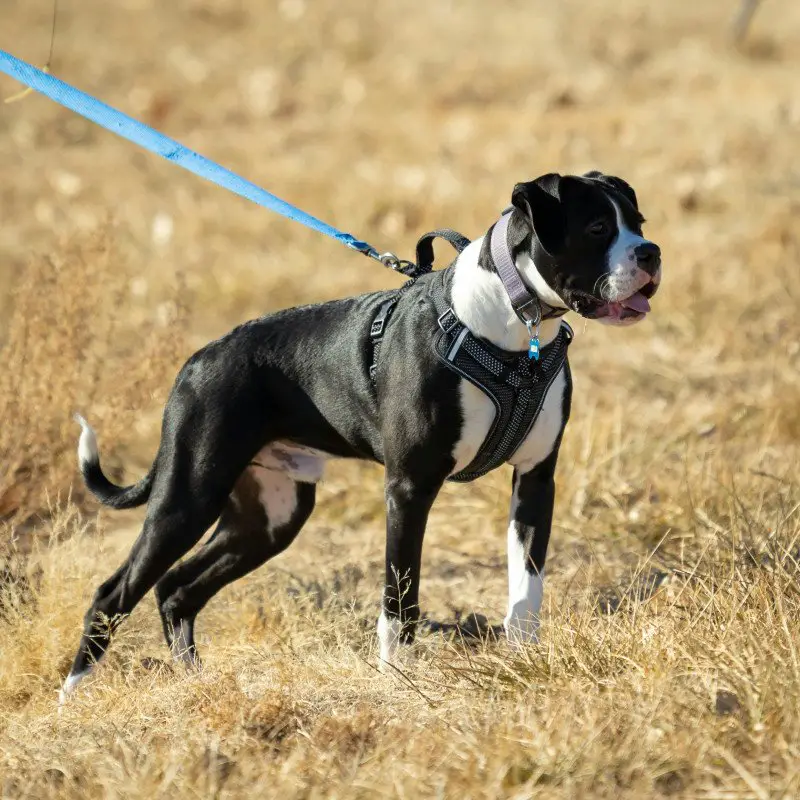- A. Detailed Characteristics of the Boxer Breed
- B. Temperament and Behavior of Boxers
- C. Specific Boxer Traits
- D. Analysis of Boxers as Family Dogs
- E. Boxers with Other Pets
- F. Boxer and Family Lifestyle Compatibility
- G. Care and Maintenance of Boxers
- H. Grooming and Health Care
- I. Training and Socialization
- J. Wrapping Up: Are Boxers a Good Family Dog?
Boxers truly are a breed of many talents. Their history of working in military, police, search and rescue, and therapy work, coupled with their love for play and family time, makes them a remarkably adaptable breed. However, it’s not just their versatility that marks them as a top contender for families. This breed boasts several unique characteristics that distinguish them from others. They have an eager-to-please temperament, vibrant energy and a muscular body, reflecting their strength and dynamic personality.
The question of ‘Are Boxers a good family dog?’ is frequently asked by potential pet owners. It’s not a decision to be taken lightly. Choosing a dog is an important step in building a family, bringing comfort, companionship, and responsibility. A pet can add an immense amount of joy and laughter to a home, and a Boxer’s unique personality is sure to contribute to creating cherished family memories.
Boxers’ reputation as ‘a jester in the world of dogs’ is attributed to their cheerful personality. Their strong frequently wagging tail reveals their constant optimism and cheerful disposition. It’s no wonder that those who have a Boxer in their life often find it hard to live without one. But does their playful and patient nature, their protectiveness and loyalty make them an ideal family pet?
In choosing a family dog, several factors should be taken into account. These include considering the breed’s temperament, their health concerns, and their specific care needs. While a furry friend’s appealing looks or reputation might make them seem like a great choice on the surface, understanding the specifics associated with their breed can help determine if they’re truly the right fit for your family.
As we delve deeper into the world of the Boxer breed, you’ll get to understand why this friendly, high-spirited, and outgoing breed often tops the chart in the category of best family dogs. Whether you’re a first-time dog owner or have had many years of dog-owning experience, it is our hope that this exploration will help you get a clear perspective on whether Boxers are indeed the right choice for your home and family.
Table of Contents
Detailed Characteristics of the Boxer Breed
Physical Attributes of Boxers
Bred initially as hunting dogs, Boxers are typically medium-sized dogs with a robust and muscular physique—an attribute that speaks to their power and agility. Male Boxers typically stand about 22 to 25 inches tall at the shoulder, while females reach approximately 21 to 24 inches. Weight-wise, males range from 65 to 80 pounds whereas females fluctuate between 50 to 65 pounds.
A unique characteristic of Boxers is their square muzzle, part of the striking physical appeal of this dynamic breed. They have a distinctive feature referred to as an “underbite,” where the lower jaw protrudes past the upper, allowing for an efficient grip.
A purebred Boxer’s coat is short and surprisingly bristly when touched, requiring minimal grooming. Common color variations include fawn and brindle, often with flashy white markings. Purebred Boxers are also recognizable by their alert and keen dark brown eyes. They are naturally eared and tailed, however, these are often docked in some territories due to age-old customs, although this practice is increasingly being abandoned.
Lifespan and Health of Boxers
The lifespan of the Boxer breed ranges between ten and twelve years. Their health, as with any breed, relies heavily on their diet, exercise routine, and care. Certain health conditions are prevalent within the breed, including cardiac and thyroid issues, hip dysplasia, and certain types of cancer. Ensuring regular veterinary check-ups can help maintain the health of your Boxer and catch any possible common Boxer illnesses as early as possible.
Proper nutrition plays a significant role in the Boxer’s health. A balanced Boxer dog diet rich in protein with the right allotment of carbohydrates, fats, vitamins, and minerals contributes to their overall well-being. With such diet, combined with plenty of exercise and regular vet visits, these wonderful pets can thrive.
Temperament and Behavior of Boxers
General Mood and Disposition

Photo by Jason Bonnicksen on Unsplash
A Boxer’s behavior stands out among other breeds. They are known as the ‘Peter Pan’ of the dog world, often maintaining their puppy-like demeanor well into their adult years. Their dynamic personality is jovial and playful, matched with an unwavering passion for family. It’s their happy-go-lucky approach to life and seemingly endless energy that makes them a favorite among children.
Boxers are a patient breed, tolerating and often enjoying the company of other animals. They are protective dogs, always on the alert, making them excellent watchdogs. However, they are not usually aggressive and will only react when necessary, protecting their family.
Level of Energy and Exercise Requirements
Boxers have a high energy level and require regular, vigorous exercise to keep them mentally and physically fit. A stimulated Boxer is a happy one. Neglecting their need for exercise can result in destructive behavior. Hence, a daily walk combined with time for active play, such as fetch or agility training, can help meet their Boxer dog exercise needs.
Specific Boxer Traits
Loyal and Protective Nature
Boxers are fiercely loyal dogs. Once they’ve bonded with their humans, they become deeply attached, often acting as their family’s guardian. Their protective nature combined with their sizable build and strength makes them a perfect family watchdog. They have a natural instinct to protect, which with proper socialization can be directed in a positive way.
Intelligence and Training Ability
This breed’s intelligence is one of their most well-renowned traits, making training Boxer puppies a joy. They are quick to understand commands and are eager to please their owners. However, they can be stubborn, thus successful Boxer puppy training requires a consistent, positive reinforcement method, establishing clear boundaries while keeping sessions fun and engaging. Boxers are versatile, excelling in everything from obedience and agility training to service work and therapy roles.
Analysis of Boxers as Family Dogs
Boxers with Children
Boxer breed, with their active, spirited, and protective boxer dog temperament, have earned a reputation as fantastic family dogs, particularly if you have kids. They develop a strong bond with family members, especially children. The “clowning” nature of Boxers makes them uniquely suitable for households with energetic children. Known for their beaming and exuberant personalities, they can offer endless amusement and companionship to the younger family members.
Boxers are rather patient with kids and enjoy their exuberance. Often, they end up being the preferred playmate due to their dynamic boxer dog personality and ability to join in fun and activity readily. However, considering the size and enthusiastic spirit of Boxers, it’s also crucial for parents to teach children how to interact and play safely with the pet, to ensure a harmonious relationship.
Moreover, their innate protective instinct emerges not just in times of danger, but in regular activities too. They often position themselves between the child and any perceived threat, adding an extra layer of safety when kids are playing outdoors. Despite their strong protective nature, Boxers are typically very gentle around children, perceptively adjusting their behavior to the child’s size and vulnerabilities.
Boxers with Other Pets
Compatibility with Other Dog Breeds

Photo by Anita Peeples on Unsplash
Boxer dogs are generally sociable and can get along well with other dog breeds. However, early socialization is key to ensure a smooth relationship. Having been initially bred as a hunting dog, Boxers can sometimes show dominant behaviors. But proper training, positive reinforcement, and regular social interaction can work wonders in easing a Boxer into sharing a home with other pets.
Interaction with Other Pet Species
Regarding adopting a boxer in a house with other types of pets, like cats or smaller mammals, their reaction may vary. While Boxers do possess a high prey drive, it does not automatically mean they cannot coexist peacefully with other species. With proper introduction and training, they can learn to respect and even form friendships with other pet species in the family.
Tips for Peaceful Coexistence
Key to maintaining a peaceful multi-pet household with a Boxer is making certain each pet feels secure and receives equal attention. Providing designated spaces for each pet can help establish boundaries. It’s also essential to monitor initial interactions and reinforce positive behavior.
Boxer and Family Lifestyle Compatibility
Activity and Space Requirements
As the boxer breed is highly energetic, they require active families who can match their movement needs. Whether it’s a backyard space for running or frequent trips to the dog park, physical activity is crucial for a boxer’s health and happiness. Their high energy levels not only shape their behavior but also their health, as regular exercise helps prevent obesity and other common boxer illnesses.
Time and Attention Needs
Boxer puppies and adults thrive on companionship and love being the center of attention. As such, they are better suited to families where someone is often at home. Boxers dislike being alone and may resort to destructive behavior if left isolated for extended periods. Their need for human company suggests that they’re not the best choice if you’re away from home for long periods. Boxers will provide loyal and affectionate companionship in return for your time and attention.
Overall, the trainable and adoring nature of Boxers combined with their energy, playfulness, and protectiveness make them an excellent choice for many families. Their compatibility with children and other pets, and their adaptability to different lifestyles, are just a few reasons why they stay one of the most loved breeds in the United States.
Care and Maintenance of Boxers
Nutritional Needs
Effective nourishment has an enormous impact on the health of any breed, including the Boxer. A Boxer dog diet should be high-quality, well-balanced, and appropriate for their life stage and level of activity.
Puppy food should contain a mix of proteins, carbohydrates, fats, vitamins, and minerals necessary for their development, while adult diet should support their health, physique, and energy levels.
Feeding times and portion sizes vary based on their age and activity level. Boxer puppies, up to six months old, should have four meals a day. Post six months until they become one-year-old, three meals a day are good. Adult Boxers can be fed twice daily. Portion size guides can often be found on dog food packaging, but discussing your Boxer’s specific needs with your vet is always sensible.
Special dietary considerations may be required in certain circumstances. For example, Boxers have a higher risk of food allergies, and careful observation should be made for any signs of allergy like skin irritation. Also, as an athletic and muscular breed, they may benefit from a diet higher in protein.
Grooming and Health Care
Regular Grooming Requirements
Boxers are relatively low-maintenance when it comes to grooming due to their short, smooth coats, but regular attention is still required to keep them looking their best. Brushing them weekly with a soft-bristle brush or a grooming mitt is typically enough to keep their coat shiny, and also offers a great bonding experience. They are average shedders and may require more frequent brushing during shedding season.
Common Health Concerns and Preventive Care
While Boxers are generally healthy, they are susceptible to certain health conditions. Boxer breed health includes common illnesses like heart conditions, cancer, and hip dysplasia. Regular check-ups with the vet and maintaining an appropriate weight can help mitigate some of these risks.
Even though Boxers have short fur, they can get cold easily, so you might need to provide a doggy sweater in colder climates. Additionally, Boxers have thin coats and lightly pigmented skin, making them susceptible to sunburn. Therefore, providing shade and using dog-friendly sunscreen can be beneficial.
Exercise and Mental Stimulation Needs
Thanks to their athletic lineage, Boxers need plenty of exercise. Regular walks, playtime, and physical activities like fetch, running, or agility activities will keep them in good shape and engage their vibrant energy. Apart from physical stimulation, the intelligent Boxer also needs mental stimulation. Training exercises, interactive toys, and agility activities can help keep their mind sharp. A balanced blend of physical and mental stimulation supports the adult Boxer behavior of being healthy, happy, and well-behaved.
Training and Socialization
Training Approach and Effectiveness
Training a Boxer can be a joy, thanks to their intelligence and eager-to-please persona. This breed responds well to positive reinforcement techniques, praising good behaviors with treats, pets, or fun playtime. Keep the training sessions short but fun and varied to keep this clever breed engaged. Consistency is critical for Boxer puppy training — establish the rules early and stick to them.
Socialization Importance and Techniques
Early socialization is crucial in shaping a Boxer’s personality and temperament. Regular exposure to a variety of people, places, and situations can help them grow into a well-rounded dog. Simple activities like taking your Boxer puppy to the park, welcoming guests to your home, or taking leisurely strolls in your neighborhood can give them plenty of socialization opportunities.
If adequately cared for, trained, and socialized, Boxers can make a tremendous family addition. Their dynamic Boxer dog personality, combined with their loyalty and love for their family, makes them an excellent choice for many families.
Wrapping Up: Are Boxers a Good Family Dog?
Having explored various aspects of the Boxer breed, from their physical attributes and health to their boxer dog temperament and needs, we can answer this question with reasonable confidence. Boxers, with their energetic and affectionate personality, can make excellent family pets. They have a child-friendly nature, known to be protective and yet indulgent with the energy kids bring into play. Their intelligence and eagerness to please also render them a joy to train, making boxer puppy training a rewarding experience.
Healthy food and active lifestyle are crucial to a Boxer’s well-being. With such care and attention, they thrive and display some of the best traits you may want in your furry buddy. Though they may require more exercise than some breeds, their athletic nature can often inspire a more active, health-conscious family lifestyle. Like other breeds, they have unique health concerns but can lead a full, vigorous life when regularly monitored and adequately cared for.
Boxers are inherently social animals and generally get along well with other pets, given proper socialization. They have a robust protective instinct but typically demonstrate aggression only when necessary, giving their family peace of mind. Their need for companionship means they favour households where someone is frequently at home. With these traits in mind, it’s clear why so many families find them an ideal pet.
However, no review can tell you definitively whether a Boxer is the right pet for your family. Every dog, not just in terms of breed but also as an individual, brings its unique personality and traits. Furthermore, every family comes with its particular lifestyle, constraints, and opportunities. Considering these aspects and picking the right breed requires careful thought and planning.
The final thought emerges from understanding your family’s lifestyle, the Boxer breed, and considering whether these align well. Starter questions can be – ‘Can we offer adequate exercise to this athletic breed?’ ‘Can our home be enhanced with a playful, protective pet?’ ‘Are we equipped to deal with the care and grooming needs of a Boxer?’ As this exploration provides a comprehensive understanding of the Boxer breed, such assessment would help determine if the Boxer is indeed the perfect family pet for your home.
Boxers, with their dynamic personalities, loyalty, and love for their family, can make a perfect pet, filling the home with energy, laughter, and memories. However, like any commitment, choosing to bring home a furry friend requires adequate thought, planning, and understanding to ensure they truly become an inseparable part of the family fabric.




